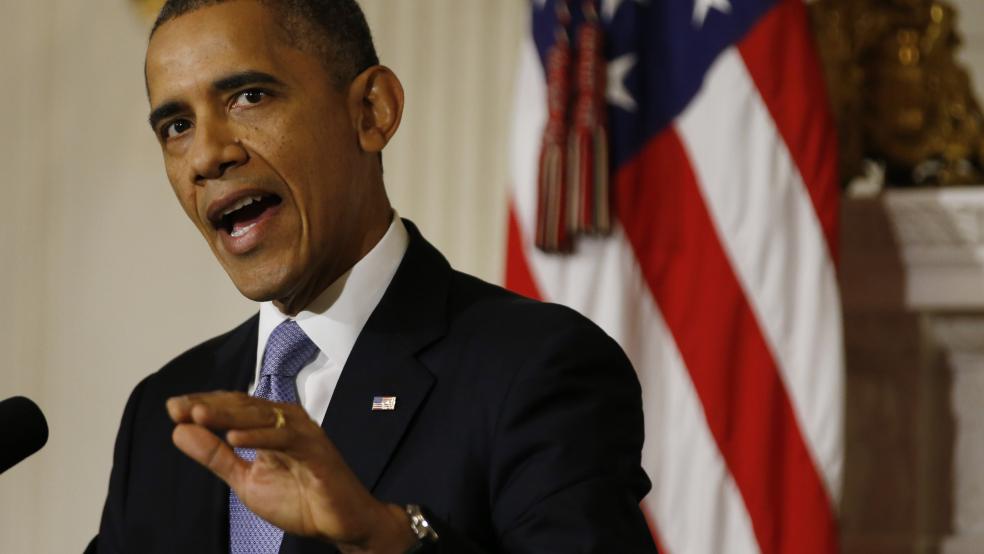Emboldened by his victory over House Republicans in ending the two-week-old government shutdown late Wednesday night, President Obama called on his rivals to join with him in achieving three goals: a long-term budget deal; comprehensive immigration reform; and new farm and food stamp legislation.
But with only three months of breathing space before the next budget crisis, the president’s legislative wish list seems more wistful than realistic.
While the House and Senate are required to cobble together a comprehensive spending and tax blueprint under the new bill, the two chambers couldn’t be further apart on immigration reform and agriculture and food stamp policy.
What’s more, House Speaker John Boehner (R-OH) and many of the Tea Party lawmakers who helped precipitate the government shutdown in a bid to derail Obamacare are largely unrepentant, even as they concede they miscalculated the effects of their brinksmanship on the economy and the mood of American voters.
RELATED: THE REAL BRAINS BEHIND THE SHUTDOWN DEAL: WOMEN
“I’m not prepared to suggest that this has been a complete loss,” Rep. Cynthia M. Lummis (R-WY), told The New York Times yesterday.
The president couldn’t resist lecturing Republicans Thursday morning, saying their strategy to stop Obamacare had set back the economy, undermined trust in the government, and reduced the global stature of the U.S.
“We hear some members who pushed for the shutdown say they were doing it to save the American economy,” he said. “But nothing has done more to undermine our economy in the past three years than the kind of tactics that create these manufactured crises. It has encouraged our enemies, it has emboldened our competitors and it has depressed our friends who look to us for steady leadership.”
Yet the president quickly pivoted to the long list of unfinished business in Washington, urging Republicans to somehow set aside their differences with him and engage in a burst of legislative action this fall.
BUT WILL IT HAPPEN?
Simply defining a new legislative must-do list doesn’t mean it will happen, of course, and all three of the president’s goals may prove highly elusive:
Budget: A new bicameral committee has until Dec. 13 to negotiate a broader budget blueprint.
After Senate Budget Committee Chairwoman Patty Murray (D-WA) drafted a Democratic budget last March, House Budget Committee Chairman Paul Ryan (R-WI) and other House GOP leaders repeatedly rebuked her efforts to draw them to the bargaining table.
Today, those two budget chiefs met for breakfast with other members of the special committee to get the talks rolling. Murray voiced optimism that the two political parties could find “common ground.” But if experiences with “super budget committees” and blue-ribbon deficit reduction panels are any guide, the latest round of negotiations could end in frustration and gridlock.
Ryan’s House-passed plan claims to wipe out the deficit in ten years, but that assumes Congress will eventually repeal Obamacare and impose dramatic cuts in health care services. Murray’s budget counts on $1 trillion of additional taxes in the coming decade for deficit reduction, a revenue increase that Republicans have taken the equivalent of a blood-oath to oppose.
The biggest sticking point is likely to be over the future of the sequester, the automatic spending cuts that first took hold last winter. Democrats desperately want to eliminate the sequester, which is eating into many popular domestic programs. Republicans believe the automatic cuts are good for imposing budget discipline, but worry about their effects on defense. The one source of alternative spending cuts would come from entitlement programs such as Social Security and Medicare, but both programs have strong constituencies that make them difficult to trim.
Immigration: The Senate passed comprehensive immigration reform in June that would give as many as 11 million undocumented workers a pathway to citizenship. It beefed up border security, gave green card access to undocumented workers who entered this country as children, and established a 13-year process for obtaining citizenship.
Fourteen Senate Republicans voted with Democrats to approve the measure 68 to 32, but the initiative almost instantly stalled in the House.
House Judiciary Committee Chairman Bob Goodlatte (R-VA) opposes the measure and prefers a step-by-step approach, calling the Senate bill in an editorial last month for the National Review “fundamentally flawed and unworkable.” Goodlatte wants to prioritize enforcement in the first of a series of smaller bills, a strategy that would drag out the legislative process – making it difficult to see how the overhaul would occur under Obama’s timeline.
Farm Bill: The House and Senate are set to talk through their differences over the five-year farm bill in the next two weeks, finally trying to deliver on a deadline missed a year ago.
The main obstacle is food stamps. The House in July passed a farm bill along partisan lines—216 to 208—that decoupled the food stamp program from the farm bill altogether. A previous measure cut the SNAP program by $20 billion over a decade but failed to be significant enough to satisfy conservative Republicans. That whittled down a bill that would have approached $1 trillion in 10 years to $196 billion in farm subsidies, payments and assistance.
The Senate-passed farm bill reduced food stamp funding by $4 billion. The program cost $80 billion last year, a dramatic increase from $40 billion in 2008.






